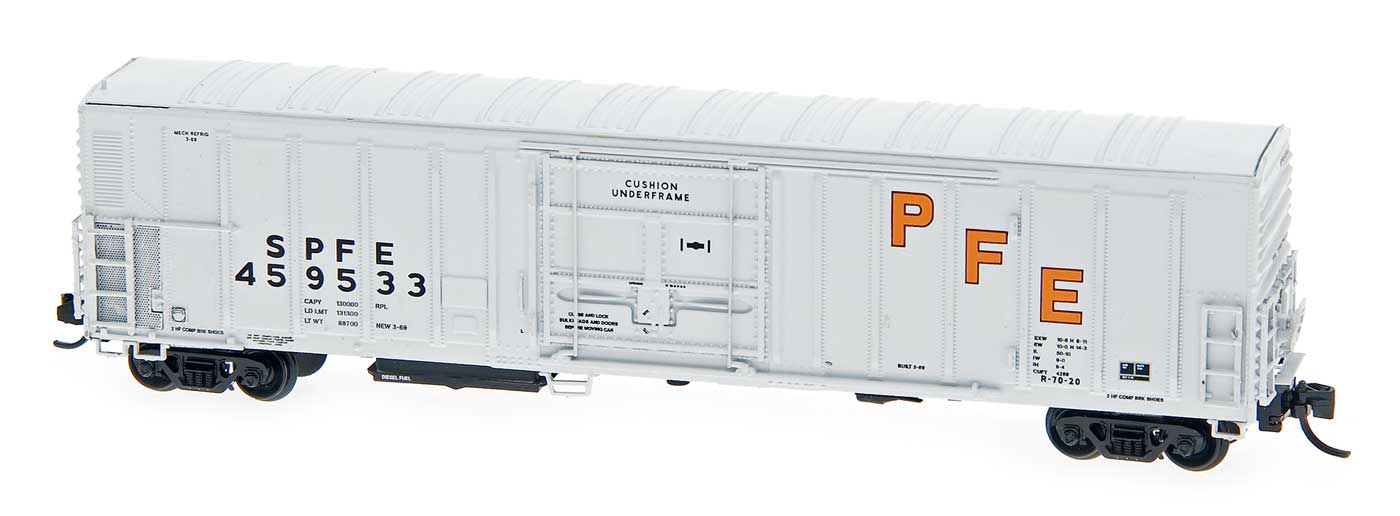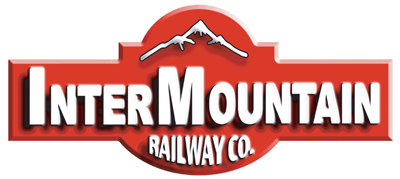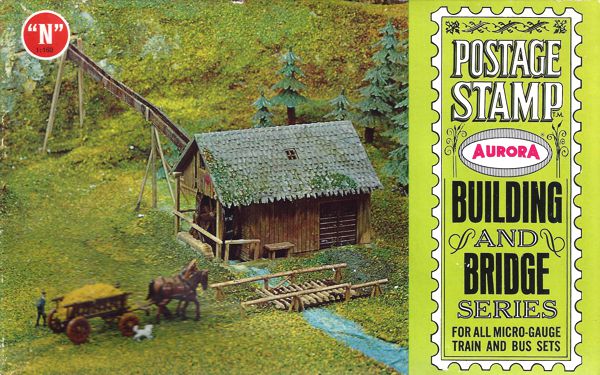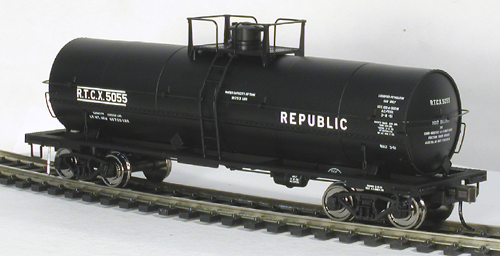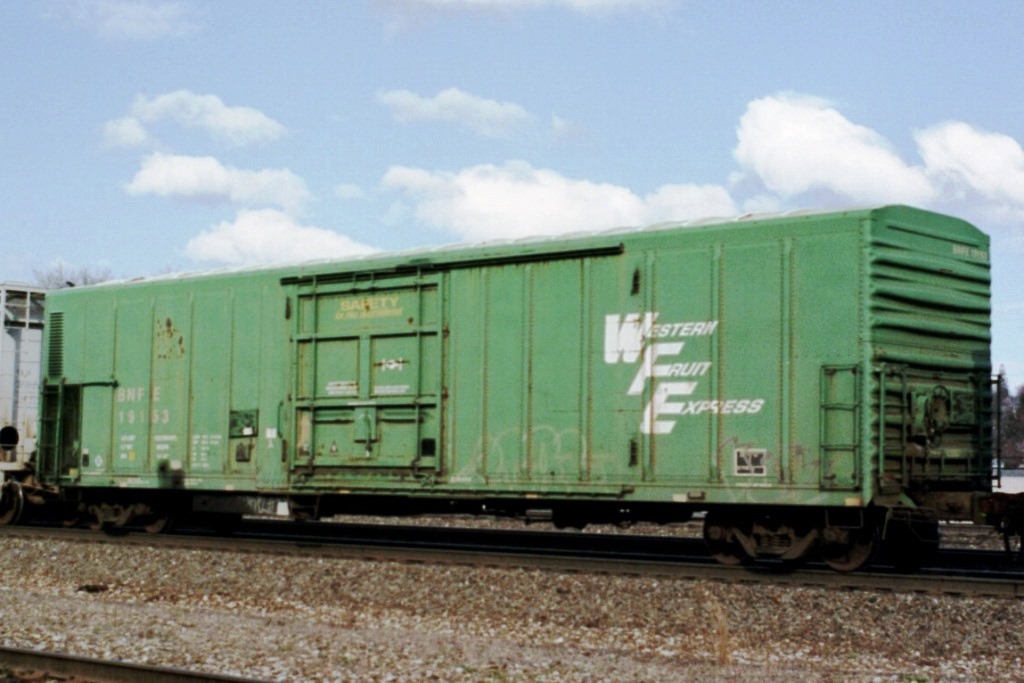Specific Item Information: Built: BLT 3-69
Prototype History: Pacific Car and Foundry responded to the railroad’s migration from ice stored in bunkers as a primary cooling system to the diesel mechanical systems. The mechanical reefers could keep a more regular temperature, often times colder then what the ice bunker cars could at the time. Initially mechanical reefers were used primarily in frozen food service. This would soon change as mechanical refrigeration began to replace ice-based systems. Soon after, mechanical refrigeration units replaced the “armies” of personnel required to re-ice the cars. Several different deliveries of the PC&F 57’ mechanical to many different railroads in the mid to late 1960s. Many have been rebuilt and are still in service today.
These 50'-10" mechanical refrigerator cars were built by PC&F in 1969-70 and featured 4269 ft3 capacity and a 10'-6" door opening. Note that this body style is sometimes referred to as 57', however, the mechanical refrigeration eqipment takes up space on one end of the car thus leaving a nominal 50' usable inside length for loading. Bangor and Aroostook often leased it’s reefer fleet to Pacific Fruit Express in the off season for the railroad. This turned out to be a peak season for PFE in California. Green Bay and Western purchased several classes of 57’ Mechanicals from the BAR. Many were hastily patched and put into service. The GB&W cars were often seen on the North Western Pacific in California carrying butter from the Humbolt Bay to eastern markets.
These 50'-10" mechanical refrigerator cars were built by PC&F in 1969-70 and featured 4269 ft3 capacity and a 10'-6" door opening. Note that this body style is sometimes referred to as 57', however, the mechanical refrigeration eqipment takes up space on one end of the car thus leaving a nominal 50' usable inside length for loading. Bangor and Aroostook often leased it’s reefer fleet to Pacific Fruit Express in the off season for the railroad. This turned out to be a peak season for PFE in California. Green Bay and Western purchased several classes of 57’ Mechanicals from the BAR. Many were hastily patched and put into service. The GB&W cars were often seen on the North Western Pacific in California carrying butter from the Humbolt Bay to eastern markets.
Road Name History: 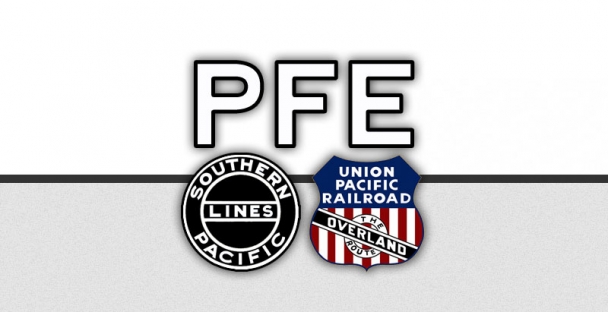 Pacific Fruit Express (reporting mark PFE) was an American railroad refrigerator car leasing company that at one point was the largest refrigerator car operator in the world. The company was founded on December 7, 1906 as a joint venture between the Union Pacific and Southern Pacific railroads. It began operation on October 1, 1907, with a fleet of 6,600 refrigerator cars built by the American Car and Foundry Company (ACF).
Pacific Fruit Express (reporting mark PFE) was an American railroad refrigerator car leasing company that at one point was the largest refrigerator car operator in the world. The company was founded on December 7, 1906 as a joint venture between the Union Pacific and Southern Pacific railroads. It began operation on October 1, 1907, with a fleet of 6,600 refrigerator cars built by the American Car and Foundry Company (ACF).
In 1923, the Western Pacific Railroad joined the venture by leasing its own, brand new fleet of 2775 reefers to PFE. They were painted in standard PFE colors with only WP heralds on the cars instead of the paired UP-SP markings. The WP cars were all retired by the late 1950s, among the last wooden reefers in PFE's fleet. WP ended its partnership with PFE in late 1967 and joined Fruit Growers Express instead.
PFE's assets were divided between the UP and SP when the company was split on April 1, 1978. It is now a UP subsidiary.

In 1923, the Western Pacific Railroad joined the venture by leasing its own, brand new fleet of 2775 reefers to PFE. They were painted in standard PFE colors with only WP heralds on the cars instead of the paired UP-SP markings. The WP cars were all retired by the late 1950s, among the last wooden reefers in PFE's fleet. WP ended its partnership with PFE in late 1967 and joined Fruit Growers Express instead.
PFE's assets were divided between the UP and SP when the company was split on April 1, 1978. It is now a UP subsidiary.
Brand/Importer Information: InterMountain was founded in 1985 by Fred Brummet. They got started in the model railroad business by producing O-Scale model kits. They got started in the N Scale business almost a decade later when in 1994 they introduced the 40-23 reefer car in kit form. Later, in 1998, they started producing RTR (Ready-to-Run) models. By the early 2000s, InterMountain phased out kit production in favor of the RTR models.
The InterMountain Railway company is located at 1224 Boston Ave in Longmont, CO. They are a manufacturer of HO, N and Z scale model trains. They have produced kits as well as RTR (Ready-To-Run) models. Their N Scale products include locomotives as well as rolling stock. Their rolling stock lineup includes Boxcars, Hoppers, Tank Cars, Reefers, Gondolas, Stock Cars and Flatcars.
Their locomotive releases have primarily been diesel units, with the one major exception being their series of AC-12 Cab Forward steam locos. Their diesel lineup includes F3's, F7's, F9's, SD40's, SD45's and FT units. They are known for quality and detail. They also release their rolling stock in larger varieties of road numbers than most of the other manufacturers.
The InterMountain Railway company is located at 1224 Boston Ave in Longmont, CO. They are a manufacturer of HO, N and Z scale model trains. They have produced kits as well as RTR (Ready-To-Run) models. Their N Scale products include locomotives as well as rolling stock. Their rolling stock lineup includes Boxcars, Hoppers, Tank Cars, Reefers, Gondolas, Stock Cars and Flatcars.
Their locomotive releases have primarily been diesel units, with the one major exception being their series of AC-12 Cab Forward steam locos. Their diesel lineup includes F3's, F7's, F9's, SD40's, SD45's and FT units. They are known for quality and detail. They also release their rolling stock in larger varieties of road numbers than most of the other manufacturers.
Item created by: nscalestation on 2016-12-04 12:35:04
If you see errors or missing data in this entry, please feel free to log in and edit it. Anyone with a Gmail account can log in instantly.
If you see errors or missing data in this entry, please feel free to log in and edit it. Anyone with a Gmail account can log in instantly.



